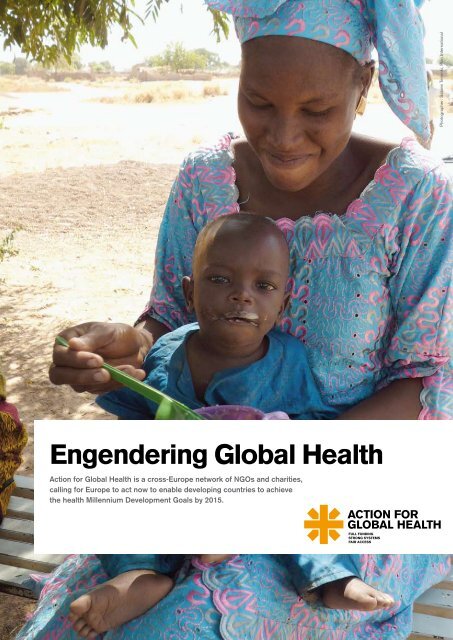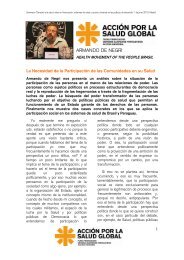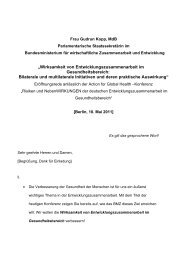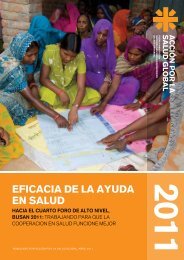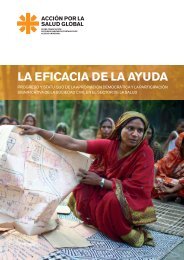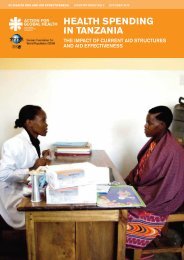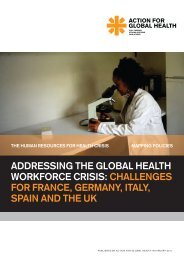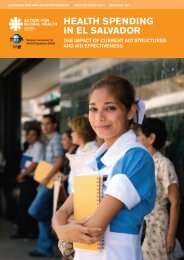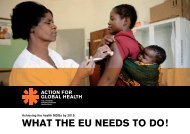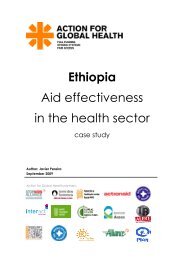Engendering Global Health - Action for Global Health
Engendering Global Health - Action for Global Health
Engendering Global Health - Action for Global Health
You also want an ePaper? Increase the reach of your titles
YUMPU automatically turns print PDFs into web optimized ePapers that Google loves.
Photographer: Sabine Terlecki, Plan International<br />
<strong>Engendering</strong> <strong>Global</strong> <strong>Health</strong><br />
<strong>Action</strong> <strong>for</strong> <strong>Global</strong> <strong>Health</strong> is a cross-Europe network of NGOs and charities,<br />
calling <strong>for</strong> Europe to act now to enable developing countries to achieve<br />
the health Millennium Development Goals by 2015.
INDEX<br />
05<br />
09<br />
10<br />
15<br />
19<br />
23<br />
24<br />
26<br />
Gender - A <strong>Health</strong> and Development Issue<br />
How is Gender important <strong>for</strong> <strong>Health</strong>?<br />
Why integrate Gender in the <strong>Health</strong> Millennium<br />
Development Goals?<br />
Gender Equality and the Right to <strong>Health</strong><br />
<strong>Engendering</strong> Aid Effectiveness<br />
Gender Monitoring and Evaluation - a tool <strong>for</strong> change<br />
Recommendations<br />
Imprint<br />
ACTION FOR GLOBAL HEALTH | 3
“A gender perspective means recognising that women stand at the<br />
crossroads between production and reproduction, between economic<br />
activity and the care of human beings, and there<strong>for</strong>e between economic<br />
growth and human development.”<br />
Gita Sen, gender and development scholar and policy activist<br />
4 | <strong>Engendering</strong> <strong>Global</strong> <strong>Health</strong>
Gender - A <strong>Health</strong> and Development Issue<br />
In many parts of the world, simply being a woman<br />
is a health risk. Gender has a crucial impact on<br />
a person‘s health. So does poverty. Worldwide,<br />
women have less access to health care, health<br />
in<strong>for</strong>mation, and have little command over aspects of<br />
their own bodies. Gender inequality severely affects<br />
a person’s ability to realise his or her right to health.<br />
Gender equality and women’s empowerment are,<br />
there<strong>for</strong>e, central to the achievement of the health<br />
Millennium Development Goals.<br />
ACTION FOR GLOBAL HEALTH | 5
Improving primary healthcare through the principles<br />
of universal access, equity, sustainability and<br />
intercultural exchange on the Altiplano of La Paz<br />
(Bolivia)<br />
In the region of Bolivian Altiplano the majority of the<br />
population is of Aymara origin.The population almost<br />
entirely depends on subsistence farming, rearing a<br />
little livestock and selling surplus in local markets.<br />
This subsistence living often means vast communities<br />
living below the poverty line.<br />
In dealing with this extremely poor community, Medicos<br />
del Mundo aimed its intervention in the health<br />
field at extending the coverage of health services<br />
and integrating and supporting the most vulnerable<br />
groups (women, children, elderly and disabled). The<br />
intervention aims to reduce poverty, promote equity<br />
and improve access to health services through the<br />
strengthening of public systems. It embraces the<br />
already existing and well-functioning system of traditional<br />
healers (yatiris) and traditional midwives.<br />
Pregnancy and birth-related health practices required<br />
particular attention due to the cultural sensitivity of<br />
pregnancy and birth. The natal facilities were painted<br />
with earth colours, a factor of great importance in<br />
Aymara culture, and both family members and traditional<br />
midwives are able to accompany the women<br />
during delivery. Traditional herbs and delivery-friendly<br />
equipment are used. The facilities are backed-up by<br />
hospital and other health facilities <strong>for</strong> any emergency<br />
cases.<br />
Regular attempts are made to in<strong>for</strong>m the general<br />
population about these services. In addition, traditional<br />
and biomedical health providers are trained and<br />
encouraged to exchange experiences between both<br />
health models. The ultimate aim is to introduce and<br />
sustain a relationship of freedom and mutual cultural<br />
respect. In doing so, Medicos del Mundo advocates<br />
<strong>for</strong> harmonious relationships between groups who<br />
identity the practices, traditional and more western/<br />
biomedical, as heterogeneous.<br />
By integrating specific and culture-sensitive needs<br />
of women into state health care centres a genuine<br />
trans<strong>for</strong>mation of understanding other cultures was<br />
triggered, as well as helping to combat racism and<br />
sexual discrimination. Aymara women were given the<br />
opportunity to achieve a better quality of life through<br />
actions aimed at improving their health status and<br />
recognising their contributions to the community.<br />
Yedra Garcia, AfGH partner Medicos del Mundo in<br />
Spain<br />
6 | <strong>Engendering</strong> <strong>Global</strong> <strong>Health</strong>
Photographer: Ernesto Rodrigo, Plan International
Sex refers to biological differences between men and women.<br />
Gender describes the characteristics which are considered<br />
‘masculine’ and ‘feminine’ in a society.<br />
8 | <strong>Engendering</strong> <strong>Global</strong> <strong>Health</strong>
How is Gender important <strong>for</strong> <strong>Health</strong>?<br />
Men and women face different health risks as a<br />
result of both biological (sex) and social (gender)<br />
differences. Due to biological differences, men and<br />
women have different health needs, <strong>for</strong> instance in<br />
relation to reproductive health.<br />
Gender relates to women’s and men’s roles, behaviours,<br />
rights and responsibilities in society. In most<br />
cases, women are in a position of socio-economic<br />
disadvantage compared to men. This negatively<br />
affects their health as they are less likely to have the<br />
resources to protect their health, and tend to have<br />
less access to health in<strong>for</strong>mation and appropriate<br />
health care.<br />
Poverty and gender in<br />
economic crisis<br />
Because of women’s gender roles in most societies,<br />
they carry the primary responsibility <strong>for</strong> the care and<br />
well-being of the family and also do most of the caring<br />
work in society. During economic crisis women<br />
are affected in particular ways. Cuts in public sector<br />
spending and in the health sector specifically can<br />
disproportionately impact women. The care work<br />
is relocated from the state to the private household,<br />
increasing the load of unpaid work <strong>for</strong> women. At<br />
the same time, women and girls experience greater<br />
barriers to receiving adequate health care.<br />
Gender roles also affect men’s health. Certain<br />
behaviours which have negative health effects are<br />
sometimes regarded as ‘masculine’, such as smoking<br />
and drinking, as well as promiscuity, increasing<br />
exposure to sexually transmitted diseases.<br />
Gender inequalities also interact with other inequalities,<br />
such as ethnicity, age and socio-economic<br />
class.<br />
Poverty and gender are key factors determining<br />
a person’s health. Living in poverty has detrimental<br />
effects on health status, and seventy percent of those<br />
who live in extreme poverty are women.<br />
ACTION FOR GLOBAL HEALTH | 9
Why integrate Gender in the <strong>Health</strong> Millennium<br />
Development Goals?<br />
The fight against poverty requires equality and justice <strong>for</strong> women. Helping<br />
communities out of poverty will depend on women’s participation<br />
and leadership, access to health and education and other resources.<br />
Development includes the equal right <strong>for</strong> men and women to enjoy the<br />
best attainable standard of health. For women in particular this includes<br />
being able to enjoy their reproductive and sexual rights, freedom<br />
from violence, and equal rights in the family and in society.<br />
10 | <strong>Engendering</strong> <strong>Global</strong> <strong>Health</strong>
Photographer: Jean Baptiste Lopez dla Medicos del Mundo<br />
At the Millennium Summit in 2000 the 189 member<br />
states of the United Nations made a commitment in<br />
the Millennium Declaration to achieve eight goals,<br />
now referred to as the Millennium Development<br />
Goals (MDGs). The eight Millennium Development<br />
Goals aim at reducing poverty, promoting education,<br />
improving maternal health, promoting gender equality,<br />
and combating child mortality, HIV/AIDS and other<br />
diseases. The goals are to be achieved by 2015.<br />
<strong>Health</strong> is a vital driver of economic development.<br />
In order to achieve the health MDGs by 2015, significant<br />
action and increased political will are necessary.<br />
MDG 5 aims to improve maternal health by reducing<br />
maternal mortality and morbidity rates and provide<br />
access to reproductive health. There is still a long<br />
way to go to achieve this goal. Over half a million<br />
women worldwide die every year during pregnancy<br />
or childbirth, and over 90 percent of these largely<br />
preventable deaths occur in developing countries. In<br />
many countries women do not have access to contraceptives<br />
and/or pre- and antenatal care. Because of<br />
their low socio-economic position, women often have<br />
no power to protect themselves from HIV/AIDS and<br />
other sexually transmitted diseases.<br />
Gender equality and the empowerment of women are<br />
the focus of the third MDG. But more than that, both<br />
health and gender equality cut across all eight<br />
development goals. Promoting health and expanding<br />
health systems are important conditions <strong>for</strong><br />
sustainable development. At the same time, gender<br />
inequalities have to be addressed in order to improve<br />
women‘s health – and thereby the health of their<br />
families.<br />
ACTION FOR GLOBAL HEALTH | 11
Plan: Children break the silence as peer educators<br />
on Female Genital Mutilation (FGM)<br />
Plan, through local NGOs, works with child peer<br />
educators to break the silence on female genital mutilation<br />
(FGM) in Sierra Leone. The children focus on<br />
harmful traditional practices including FGM to try to<br />
promote girls‘ rights to a life free from mutilation.<br />
Female genital mutilation (FGM) is a common ritual<br />
in Sierra Leone. The great majority of the population<br />
adheres to the practice of FGM as an ancient, valued<br />
tradition without perceiving it as a rights violation<br />
(Plan 2005 FGM research). Consequences include<br />
enormous health-related, educational and socio-economic<br />
costs. Practitioners of FGM benefit socially<br />
and financially as it is their main source of income.<br />
Feared and admired at the same time, they are often<br />
regarded to possess supernatural powers. This<br />
explains the overall reluctance to stop the practice of<br />
FGM and the courage it takes <strong>for</strong> NGOs to address<br />
the issue.<br />
Initiation of girls is carried out throughout the year<br />
even during school sessions. When parents/guardians<br />
of a girl are ready to initiate her, her age and<br />
school attendance are of little consideration to them.<br />
This is one reason why many girls miss or even drop<br />
out of school.<br />
In Plan’s project Breaking the Silence children work<br />
on FGM through appropriate community sensitization.<br />
The activities follow a gender approach,<br />
addressing girls and women as well as boys and<br />
men: “We play theatre and role-plays on FGM in<br />
schools and in the communities to in<strong>for</strong>m the children<br />
and their parents. And we also talk to the children:<br />
boys to boys and girls to girls! It is important to talk<br />
also to men because they can pass the message to<br />
traditional leaders” said a girl peer educator.<br />
Children argue that girls need to be at least 18 to<br />
give their consent. Instead of FGM, they promote a<br />
possible continuation of transition rituals <strong>for</strong> girls into<br />
womanhood, but without the cutting. In Port Loko<br />
and Bombali Districts, children use the country’s<br />
Child Right Act from 2007 that prevents harmful<br />
traditional practices and the United Nations Convention<br />
on the Right of the Child (CRC) to justify their<br />
campaign against FGM.<br />
In 2009 Plan has managed to break the silence on<br />
FGM – and more importantly – a break in the practice<br />
on Female Genital Mutilation (FGM). Thus a<br />
dialogue regarding this practice has been started.<br />
Initial encouraging results can already be witnessed:<br />
in Port Loko and Bombali Districts parents and girls<br />
refuse the practice and about 20 FGM practitioners<br />
have put down their tools in response.<br />
Sabine Terlecki, AfGH partner Plan EU Liaison Office<br />
in Brussels<br />
12 | <strong>Engendering</strong> <strong>Global</strong> <strong>Health</strong>
Photographer: Sabine Terlecki, Plan International
Gender Mainstreaming is a strategy <strong>for</strong> promoting gender equality.<br />
Gender Mainstreaming integrates equality as a cross-cutting task in<br />
everyday practice and throughout all stages of policy development,<br />
research, advocacy, legislation, resource allocation, planning, implementation<br />
and monitoring of programmes and projects.<br />
It is not enough to simply “add in” a focus on women. If health of<br />
women and men is to be addressed adequately, gender needs to<br />
be taken into account in health research, health system re<strong>for</strong>ms,<br />
health education, health outreach, and health policies and<br />
programmes.<br />
14 | <strong>Engendering</strong> <strong>Global</strong> <strong>Health</strong>
Gender Equality and the Right to <strong>Health</strong><br />
Women‘s rights are human rights<br />
The right to health is a human right. Women have<br />
a right to health. This means empowering women<br />
and protecting their rights. It means preventing<br />
violations of women’s rights (such as violence against<br />
women) and addressing particular vulnerabilities of<br />
women in order to improve their access to health. It<br />
means taking a broad approach to address women‘s<br />
living conditions, access to education, nutrition and<br />
clean water. <strong>Health</strong> is a human right which requires<br />
economic security to be realised.<br />
Empowering women is central to strengthening<br />
women‘s rights and women’s health, and to achieving<br />
gender equality and equity. In order to accomplish<br />
that we have to:<br />
• Give women control over their own bodies and<br />
sexualities, and their lives.<br />
• Provide women and men with equal access to<br />
adequate health care.<br />
ACTION FOR GLOBAL HEALTH | 15
AIDOS Methodology <strong>for</strong> Creating Primary <strong>Health</strong><br />
Centres <strong>for</strong> Sexual and Reproductive <strong>Health</strong><br />
Since 1986 the Italian Association <strong>for</strong> Women in Development<br />
– AIDOS – has developed a flexible model<br />
<strong>for</strong> creating primary Sexual and Reproductive <strong>Health</strong><br />
Centres (S&RHC) based on an integrated, holistic<br />
approach adaptable to different cultural, social, religious<br />
and political contexts. The approach deals with<br />
women-centred health care, prevention and education<br />
in the community. AIDOS‘ vision is to consider all<br />
women beyond their reproductive roles as solely wife<br />
and mother.<br />
The Centres are run by local partners with AIDOS’<br />
financial, organisational and technical support, and<br />
are connected with hospitals and other health care<br />
facilities. The centres offer a range of services:<br />
gynaecological care, modern contraception, treatment<br />
and prevention of sexually transmitted diseases,<br />
detection of breast and cervical cancer, ante- and<br />
post-natal care, menopausal assistance as well as<br />
psychological, social and legal counselling. The staff<br />
are trained in capacity building to promote quality and<br />
continuity of care, interaction, personalised assistance,<br />
in<strong>for</strong>med choice and consent, respect and<br />
confidentiality.<br />
One of such centres - Centre pour le Bien-être des<br />
Femmes (CBF - Women‘s <strong>Health</strong> Centre) in Burkina<br />
Faso (Ouagadougou, Sector 27) – is a joint<br />
creation between AIDOS and its local partners Voix<br />
des Femmes women association and Mwangaza<br />
<strong>Action</strong>. Burkina Faso is one of the poorest country<br />
in the world where population health indicators are<br />
poor – with high maternal and child mortality - and,<br />
in addition, high fertility rates. More than 80% of the<br />
women have undergone Female Genital Mutilation/<br />
Circumcision (FGM/C). The project focuses on providing<br />
education, in<strong>for</strong>mation and awareness about<br />
women’s sexual and reproductive rights. The choice<br />
of female professionals <strong>for</strong> almost all job positions<br />
proved to be successful in contributing to staff selfesteem,<br />
greater attendance amongst women users,<br />
as they find it easier to communicate their problems<br />
to other women, as well as women’s empowerment<br />
and freedom to speak about their fears and concerns.<br />
The Centre now has become a focal point <strong>for</strong><br />
the whole community also hosting activities such as<br />
thematic and educational meetings with the community,<br />
HIV testing, and debates with young. Men are<br />
also encouraged to accompany their wives during the<br />
ante-natal visits and participate in discussion groups<br />
concerning their responsibilities in the reproductive<br />
process and childcare.<br />
The participation of the local community is essential<br />
in this type of approach to obtain direct in<strong>for</strong>mation<br />
on priorities, needs and concerns. It has been successfully<br />
applied and documented in all the AIDOS‘<br />
Centres in several countries in Africa, Middle East,<br />
Latin America and Asia <strong>for</strong> the last twenty years. Every<br />
year around 12 000 people attend each Centre.<br />
Natalia Lupi, AfGH partner AIDOS in Italy<br />
16 | <strong>Engendering</strong> <strong>Global</strong> <strong>Health</strong>
Photographer: Jacky Naegelen <strong>for</strong> Reuters
Gender budgeting is a tool <strong>for</strong> measuring and managing financial<br />
flows in a gender-sensitive manner. Engendered budgets are critical to<br />
making gender equality a concrete reality. Gender budgeting ensures<br />
that resources are allocated in a way that will address both men’s<br />
and women’s needs.<br />
Gender sensitive budgeting is not about whether an equal amount is<br />
spent on women and men, but whether the spending is adequate to<br />
address women‘s and men‘s needs.<br />
18 | <strong>Engendering</strong> <strong>Global</strong> <strong>Health</strong>
<strong>Engendering</strong> Aid Effectiveness – implementing<br />
commitments made and enacting gender equality and<br />
the right to health<br />
Although the OECD tripled its spending on Official<br />
Development Assistance (ODA) in the area of equality<br />
of women and men from 2002 to 2006, gender-related<br />
spending still only accounts <strong>for</strong> 8 percent of all<br />
ODA appending and progress on gender equality<br />
is slow.<br />
results, including the health MDGs. Gender inequality<br />
undermines effective development aid and is<br />
also expensive.<br />
Not only is there a need to increase the level of<br />
aid <strong>for</strong> gender and health, this aid must also be<br />
used more effectively. In the Paris Declaration of<br />
2005 and the Accra Agenda <strong>for</strong> <strong>Action</strong> of 2008,<br />
states have committed themselves to increase the<br />
effectiveness of the aid that is given. All ef<strong>for</strong>ts in<br />
this respect must include a gender perspective.<br />
There is a risk that focusing solely on cost efficiency<br />
of financial aid to improve effectiveness will draw<br />
attention away from the cross cutting issues: gender<br />
equality, ecological sustainability and human rights.<br />
Yet, these cross-cutting concerns are decisive <strong>for</strong> the<br />
efficacy of the aid itself.<br />
To achieve the targets of Paris and Accra, progress<br />
on gender equality and empowerment of women is<br />
absolutely necessary. Gender equality and women’s<br />
empowerment are crucial to achieve development<br />
ACTION FOR GLOBAL HEALTH | 19
Giving women, men and the community the right<br />
in<strong>for</strong>mation <strong>for</strong> better health outcomes - Interact<br />
Worldwide<br />
Interact Worldwide (IWW) worked with the Uganda<br />
Protestant Medical Bureau (UPMB) to address the<br />
issue of health and gender inequality in Uganda. This<br />
was done through a programme aimed at reaching<br />
women and girls with quality sexual and reproductive<br />
health and HIV/AIDS in<strong>for</strong>mation and services.<br />
Working in ten mainly rural districts in Uganda,<br />
UPMB had identified that many women and other<br />
community members were not fully aware of the<br />
importance of sexual and reproductive health services.<br />
There was a lack of in<strong>for</strong>mation and knowledge<br />
of key women’s health issues, including symptoms of<br />
complications in pregnancy, birth spacing, ante-natal<br />
care and how to prevent mother-to-child transmission<br />
of HIV.<br />
With this knowledge, IWW and UPMB developed a<br />
project aimed at improving the sexual and reproductive<br />
health of poor, marginalised women and girls by<br />
increasing their access to high-quality services and<br />
enabling them to make in<strong>for</strong>med choices regarding<br />
services. The project also included a component to<br />
increase men and boys’ understanding of women’s<br />
health, acknowledging that they may serve as gatekeepers<br />
to women’s health access.<br />
community discussion groups while drama shows<br />
provided the opportunity <strong>for</strong> them to openly discuss<br />
barriers that prevent them from utilising health services.<br />
One outcome was an increased involvement of<br />
community and religious leaders in debates around<br />
sexual and reproductive health. In evaluation discussions<br />
women reported that they were aware of the<br />
participation of community leaders condemnation of<br />
gender-based violence and discriminatory practices.<br />
The project aimed to involve men in decision-making<br />
by encouraging men to accompany women to antenatal<br />
clinics. Communities put in place practices<br />
to encourage male involvement with outcomes as<br />
highlighted by this health worker: ‘“When a couple<br />
comes <strong>for</strong> the antenatal clinic, they are given first priority<br />
and more in<strong>for</strong>mation is provided to the couple<br />
<strong>for</strong> the benefit of the man, this has motivated the men<br />
to come <strong>for</strong> the subsequent visits” The result of all<br />
of this work was that all the facilities involved in the<br />
project reported an increase in number of couples<br />
attending health services together, including antenatal<br />
care.<br />
With this goal, the project conducted a communications<br />
campaign – using posters, videos and drama<br />
shows - to sensitise communities on issues of gender<br />
equality and equity. Women and girls participated in<br />
20 | <strong>Engendering</strong> <strong>Global</strong> <strong>Health</strong>
Photographer: Alf Berg, Plan International
Monitoring is a tool <strong>for</strong> assessing whether the initiatives taken have the<br />
desired effects and whether programme objectives are met.<br />
Evaluation is the process of assessing an ongoing or completed<br />
project, programme or policy, its design, implementation and results.<br />
Key activities <strong>for</strong> an effective gender monitoring & evaluation of<br />
projects, programmes or policies include:<br />
• a gender analysis in <strong>for</strong>m of a baseline study to identify the genderrelated<br />
goals<br />
• ensuring that gender is integrated into goals and objectives and clear<br />
targets are set<br />
• collecting data based on previously identified gender-sensitive<br />
indicators<br />
• assessing progress during a mid-term evaluation making corrections<br />
if necessary<br />
• assessing the overall impact on women and men<br />
22 | <strong>Engendering</strong> <strong>Global</strong> <strong>Health</strong>
Gender Monitoring and Evaluation -<br />
a tool <strong>for</strong> change<br />
If gender is to be successfully integrated into activities<br />
<strong>for</strong> health and development this requires<br />
developing an appropriate framework <strong>for</strong> assessing<br />
progress and the actual impact of these activities.<br />
Gender-sensitive monitoring and evaluation provides<br />
such a framework. It is used to show the extent to<br />
which a project, programme or policy addresses<br />
the different needs of men and women. It reveals<br />
the impact on their lives, their health and their overall<br />
social and economic well-being. It can also improve<br />
project per<strong>for</strong>mance during implementation, through<br />
mid-term evaluations, and it can help to develop<br />
lessons <strong>for</strong> future projects.<br />
ACTION FOR GLOBAL HEALTH | 23
Recommendations<br />
Make gender equality a reality by:<br />
• Pursuing MDGs and integrating a gender perspective<br />
throughout (not only when addressing MDG 3)<br />
• Promoting women’s rights, including their right to health<br />
• Promoting women’s economic empowerment<br />
• Supporting equal political participation of men and women<br />
• Allocating resources <strong>for</strong> gender equality and the empowerment of<br />
women<br />
• Promoting gender mainstreaming of organisations and<br />
agents in international cooperation <strong>for</strong> development<br />
• Including a gender perspective in the effective provision of aid<br />
24 | <strong>Engendering</strong> <strong>Global</strong> <strong>Health</strong>
A Need <strong>for</strong> political will and commitment<br />
There are many positive actions that can be taken<br />
to empower women. However, this requires political<br />
will to take the necessary action. Because gender<br />
inequalities are so deeply entrenched in institutions,<br />
policies, labour relations and market <strong>for</strong>ces, strong<br />
political commitment is necessary to develop and<br />
implement policies which can bring about changes<br />
<strong>for</strong> gender equality and the empowerment of<br />
women.<br />
ACTION FOR GLOBAL HEALTH | 25
Imprint<br />
<strong>Action</strong> <strong>for</strong> <strong>Global</strong> <strong>Health</strong> is an advocacy network of<br />
NGOs in Brussels, France, Germany, Italy, Spain and<br />
the UK, calling <strong>for</strong> Europe to take urgent action to enable<br />
developing countries to meet the health Millennium<br />
Development Goals (MDGs) by 2015. It aims to monitor<br />
how the actions and policies of European governments<br />
affect health in developing countries, and to influence<br />
decision-makers to improve their practice.<br />
Visit our website <strong>for</strong> news and comment about global<br />
health: www.action<strong>for</strong>globalhealth.eu<br />
Contact: coordination@action<strong>for</strong>globalhealth.eu<br />
Conception & Realisation<br />
KIM. Agentur für Kommunikation<br />
Kulturwerk Lothringen<br />
Lothringer Straße 36<br />
44805 Bochum<br />
Germany<br />
T +49. 234. 79 49 831<br />
F +49. 234. 79 49 834<br />
www.agenturkim.de<br />
26 | <strong>Engendering</strong> <strong>Global</strong> <strong>Health</strong>


